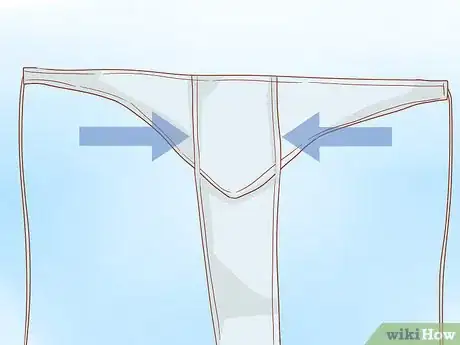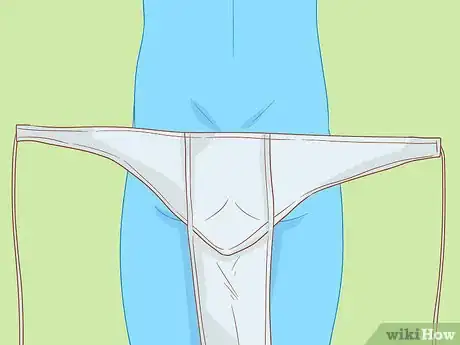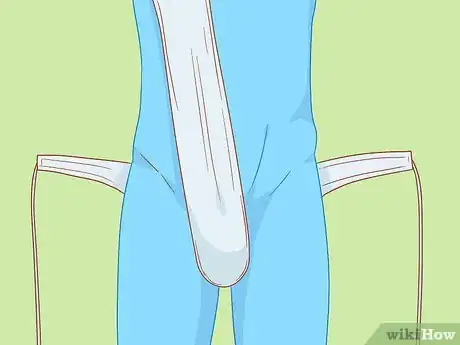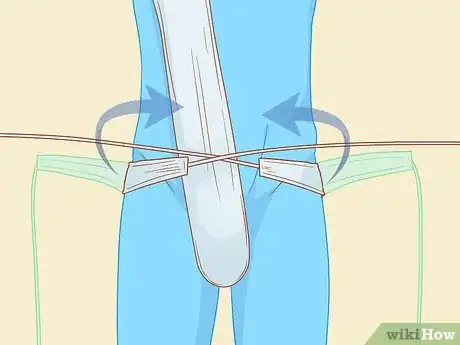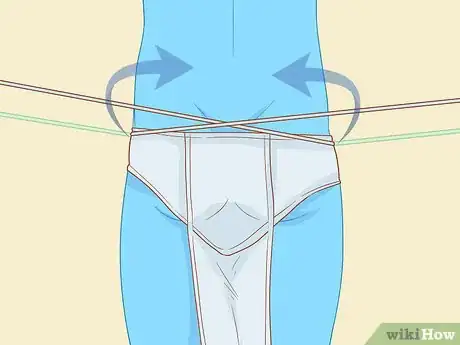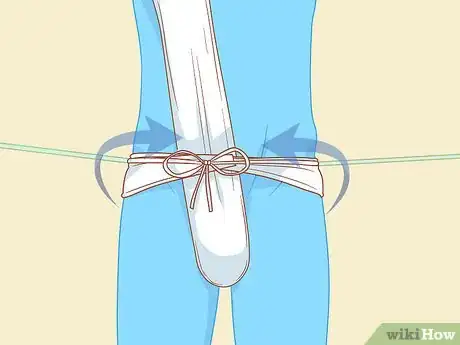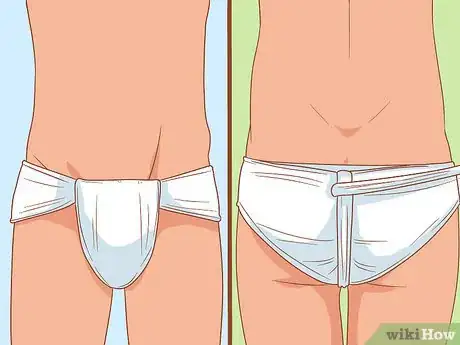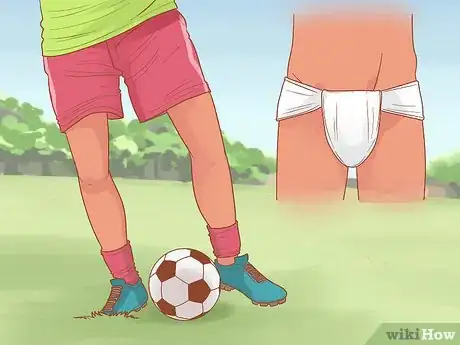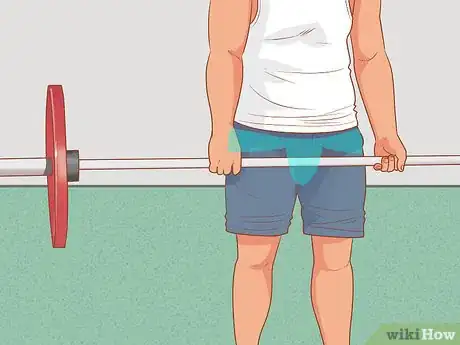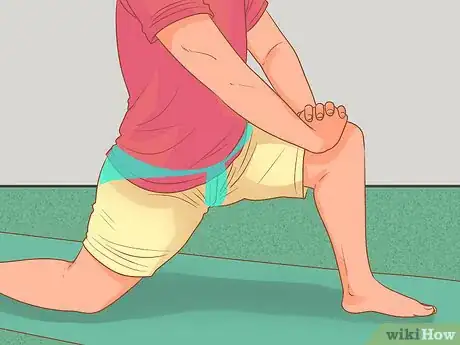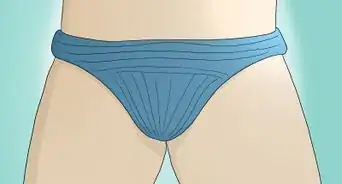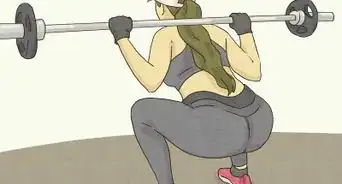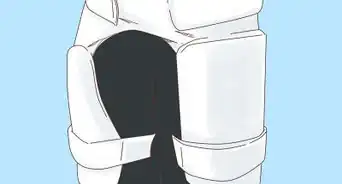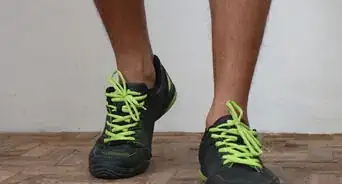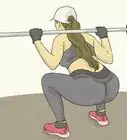This article was co-authored by wikiHow Staff. Our trained team of editors and researchers validate articles for accuracy and comprehensiveness. wikiHow's Content Management Team carefully monitors the work from our editorial staff to ensure that each article is backed by trusted research and meets our high quality standards.
There are 10 references cited in this article, which can be found at the bottom of the page.
This article has been viewed 43,745 times.
Learn more...
A langot is a type of loincloth traditionally worn by men in the Indian subcontinent. Similar to a jockstrap, it's made up of a fabric triangle with ties at the top and a long strip of fabric hanging from the bottom. Once you get it into place, it's a simple matter of wrapping and tying the straps correctly. Some people wear a langot while lifting weights, doing yoga, or in sports like wrestling, where they might require protection in the genital area.
Steps
Tying the Langot
-
1Find the seamless side of the langot. It should have a side where you can feel the seams and a side where you can't. To make it more comfortable, the seamless side should face towards your body when you start getting it in place.[1]
-
2Place the edge of the triangle with the 2 straps at the top of your backside. Place the long, flat edge of the triangle, which should have two straps extending from it, at the top of your backside.Grab one strap in each hand and bring each one around to the front so that you're pulling the fabric taut against your bottom. [2]
- The long strip of fabric, or the point of the triangle, should be hanging behind you and between your legs.
Advertisement -
3Pull the long piece of fabric through your legs and over your shoulder. Reach between your legs and grab the fabric. Pull it between your legs, making sure to keep it straight and smooth as you do. Bring it up to your waist and throw the end over your shoulder.[3]
- When pulling the fabric tight, make sure your genitals are tucked against your body and pointed backward.
- Throwing the long piece over your shoulder will keep it out of the way while you tie your langot in the front.
-
4Bring the strings across your front and cross them once. Pull them around so they're tight and then loop one string over the other like you're starting to tie a square knot, or like you're beginning to tie your shoes.[4]
- This should be about at your natural waist.
-
5Cross the strings in the back again. Pulling the strings tight, wrap them around your back. Pass them by each other and bring them to the front again on the opposite sides. Keep the strings tight while you're doing this.[5]
-
6Tie the strings in a secure bow in front. Knot the strings slightly towards one side of your hips, rather than in the center of your body – this will make the langot a little more comfortable once it's tied. Then, pull the strings tight and then tie a bow, as if you were tying a pair of shoelaces. This will secure the langot.[6]
- You can also tie a square knot.
-
7Drag the long piece of fabric back through your legs to secure it in the back. Pull the long piece of fabric off your shoulder and let it hang over the knot you just tied. Reach through your legs from the back and grab it to pull it through your legs. Pull it taut, and then tuck the end in the top of the triangle at the back.[7]
Wearing a Langot for Physical Activity
-
1Use a langot in sports where you need to protect your genitalia. The langot works much like a jock strap, so it can be used in contact sports like football, soccer, or cricket, where your genitalia could potentially be hurt. It's often worn in traditional forms of wrestling. To protect this area, insert a cup under the langot.[8]
- Make sure your athletic cup fits properly. It should cover your genitalia completely and fit up against your body.
- Once you have the langot in place, slip the cup underneath the fabric, positioning it over your genitalia, which should be up against your body and pointed toward the back. The rounded end of the cup should be toward the front.
-
2Try a langot while doing strength training. Langots have traditionally been worn during strength training, as they allow for freedom of movement. However, if your goal is to prevent a hernia, you should opt for a different undergarment. The tightness of the langot can actually cause hernias in some wearers.[9]
-
3Wear a langot for yoga to allow for freedom of movement. Traditionally, many yogis wore only a langot during yoga and nothing else. That's because it allows for high flexibility while you're moving through various yoga poses.[10]
References
- ↑ https://www.youtube.com/watch?v=ZuBxjUW64SY&feature=youtu.be&t=90
- ↑ https://www.youtube.com/watch?v=nx1QRBo_Ajk&feature=youtu.be&t=260
- ↑ https://www.youtube.com/watch?v=nx1QRBo_Ajk&feature=youtu.be&t=268
- ↑ https://www.youtube.com/watch?v=ZuBxjUW64SY&feature=youtu.be&t=150
- ↑ https://www.youtube.com/watch?v=nx1QRBo_Ajk&feature=youtu.be&t=282
- ↑ https://www.youtube.com/watch?v=ZuBxjUW64SY&feature=youtu.be&t=205
- ↑ https://www.youtube.com/watch?v=ZuBxjUW64SY&feature=youtu.be&t=275
- ↑ https://www.urologyhealth.org/patient-magazine/magazine-archives/2014/spring-2014/ask-a-urologist-athletic-cups-and-supporters
- ↑ https://www.mensxp.com/health/body-building/34535-you-don-t-really-need-to-wear-a-langot-or-jockstrap-while-weight-training-here-s-why.html
